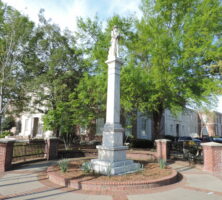Coffee County, located in Georgia’s Lower Coastal Plain, was created from sections of Clinch, Irwin, Telfair, and Ware counties on February 9, 1854.
The county is named in honor of John E. Coffee, an influential Telfair County planter and politician who served in both houses of the Georgia state legislature, as well as in the U.S. Congress. Coffee was also a prominent frontiersman, renowned for his service in the region’s Indian wars.
Coffee County is in the wiregrass region of south central Georgia, so called because of the predominance of wiregrass, which grows among the Georgia pines, especially in the Lower Coastal Plain. During the early nineteenth century, the area attracted many whites to the region, because of its abundance of game, rivers, woods, and general wildlife. Only the most adventurous pioneers actually settled there, however.

Before white immigration, Creek Indians were the original inhabitants of Coffee County. By 1827 local wars between the early settlers and the Indians, and various treaties resulting in the forced removal of the Creeks, led to their demise in the region. Native American heritage of the area lives on through the names of many of the lakes, creeks, streams, and rivers, including the Oconee River, Ocmulgee River, and the Okefenokee Swamp.
The Indian removal, along with the development of roads, was an impetus for the rapid migration of larger family units to the area. Their arrival brought an era of social change and economic prosperity for whites. Churches, schools, and new roads were built, and farmland was eventually fenced and cultivated into plantations that grew cotton and tobacco at the hands of enslaved labor.
In 1858 Douglas was established as the county seat. It was named after U.S. senator Stephen Arnold Douglas of Illinois, who became popular because of his rivalry with Abraham Lincoln for the U.S. presidency. Douglas is home to South Georgia State College, which was the first state-supported institution under the University System of Georgia.

Located five miles east of Douglas is the General Coffee State Park, which showcases the county’s pioneer heritage and natural environment. One of the main features of this park is Meeks Cabin (ca. 1830), a log structure that is one of the oldest buildings in south Georgia. The park also maintains an environmental reserve that houses various endangered species of animal and plant life. Endangered flora may also be found at Broxton Rocks Preserve, a unique sandstone outcrop that extends nearly four miles. The preserve is home to more than 500 species of plants native to the area, including rare and endangered species.
According to the 2020 U.S. census, the county’s population is 43,092.














